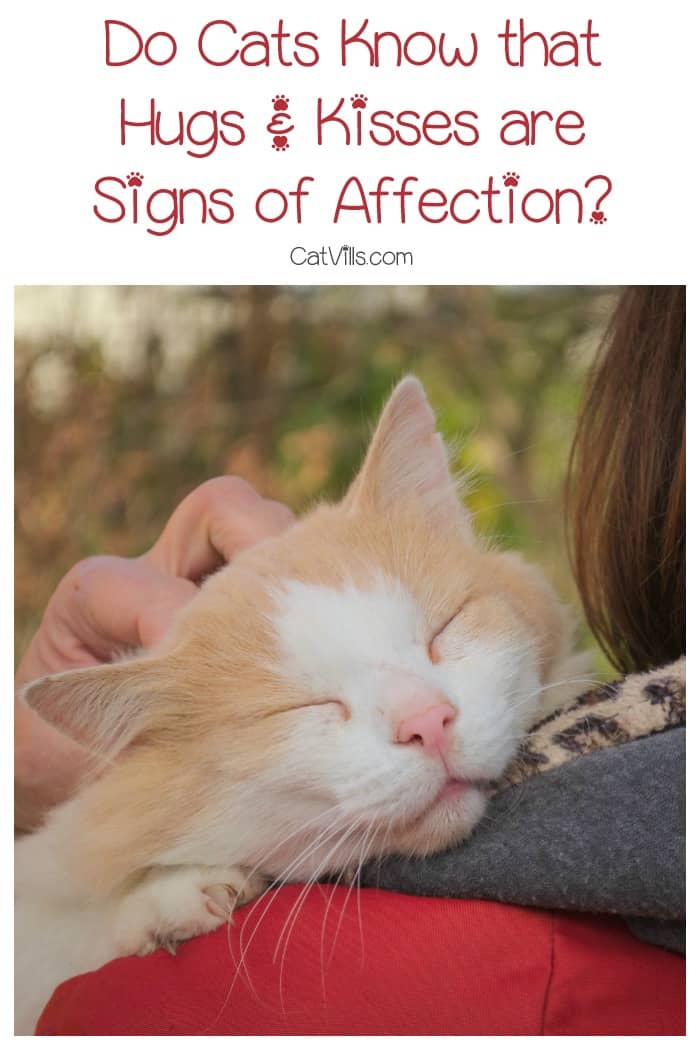Last Updated: 3 months ago
People often wonder what their cats think when they give them hugs and kisses.
Do cats understand kisses as signs of affection, or do they just think they’re being weird?
Perhaps the cats think the kisses are a bizarre attempt at grooming them!
Let’s embark on a journey to uncover the answer to the burning question of whether cats understand that hugs and kisses are signs of affection.
Do Cats Understand Kisses And Hugs As Signs of Affection?
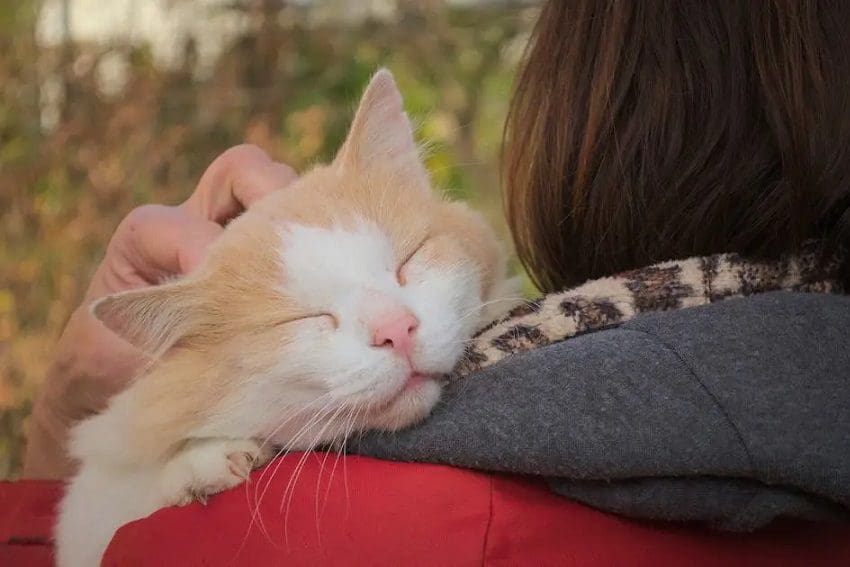
They understand, to a significant extent, the meaning behind us hugging and kissing them.
Cats are independent but affectionate creatures. Much of their time is spent grooming themselves and each other—and even us if they have the opportunity.
While grooming may have obvious hygienic purposes, for many species, including our feline friends, it is also a social activity.
Cats do think our kisses are a weird type of grooming!
Your kisses are affectionate grooming!
Kittens are used to being groomed right from birth by their mother. It is a necessary part of their development and a source of comfort, as well as a means to strengthen the bond between them.
Kisses from humans really aren’t all that different, and many cats seem to interpret them as such.
We had a cat who, as a kitten, would sit in our arms and tilt his head towards whomever was holding him.
We would kiss the top of his head, he would reach up and rub the top of his head as though he were washing it, and then he would tilt his head up again to repeat the process.
Now that we know that cats do understand hugs and kisses as signs of affection, let’s talk a bit about how to get your kitty used to all that lovin’!
How to get your cat used to your signs of affection
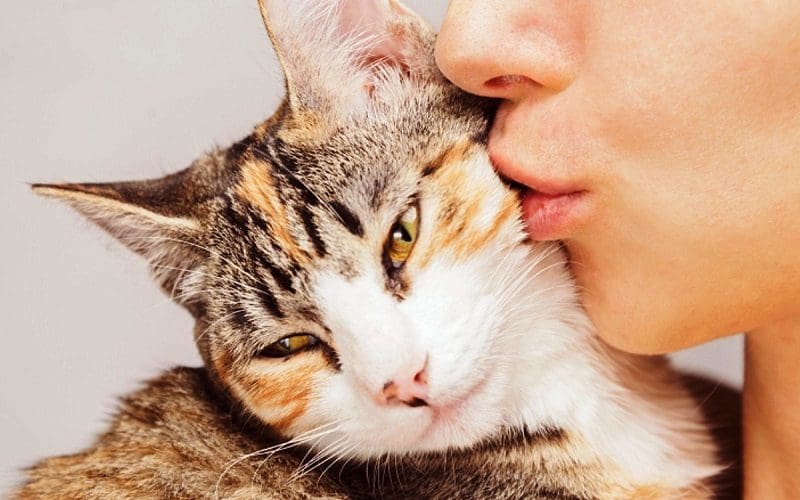
Cats can be reluctant to change, so they will likely be more receptive to your hugs and kisses if they have been exposed to human physical affection from a young age.
In many ways, they look at us as they would their mothers—especially in cases where they were weaned too young—and will indeed expect that grooming and bonding behavior from us.
Go slow and easy
That being said, even an older cat can learn to love snuggles if they are introduced at their own pace—and not, as comes to mind, like a certain cartoon character from the 90s who approached anything furry with the phrase “I’m going to hug you, squeeze you, and love you to pieces!”
Letting your child be the first to hug a cat might not be the most sound advice either, come to think of it..
Teach your kids to respect kitty
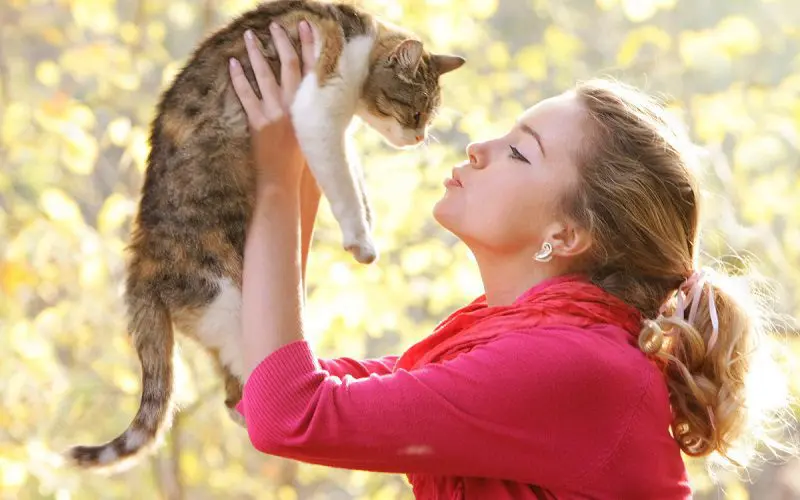
Small children should always be supervised during their interactions with pets; nothing makes a cat skittish faster than constant mauling by small, rough hands.
Teach your children to respect Kitty, to approach the cat slowly and gently, and to speak softly around animals, and your children will quickly learn animal handling skills and empathy that put them years ahead of their peers.
They will also have a friend for the life of the pet, which is a gift they won’t easily come by elsewhere.
Remember, you’re much bigger than your cat!
Always keep in mind that our sheer size in comparison to cats can be intimidating, and overwhelming them with too much too quickly can be hazardous to both your health and ours.
Many cats do not like to be tightly restrained, either, so hugs should be gentle and not cause the cat to feel trapped.
Accept that not all cats love hugs
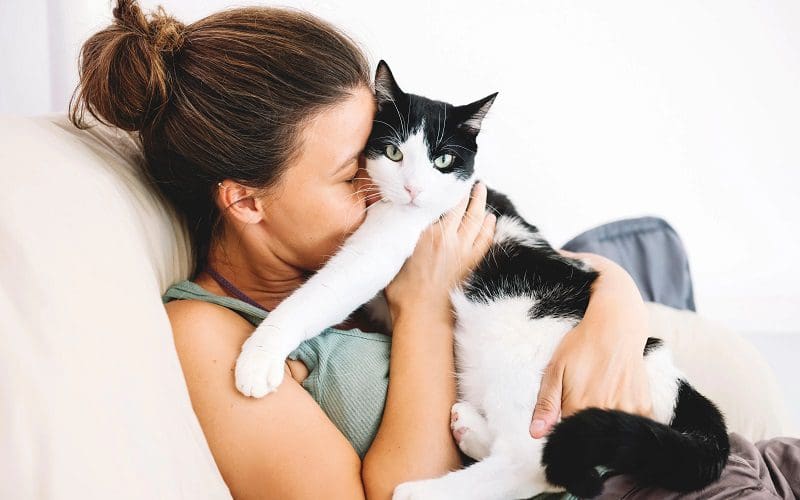
Some cats will never get used to what we think of as hugs, but they may choose to be close to you on their own terms.
My parents have a cat that hates to be petted; they’ve had her since she was very young, and their other cats love snuggles, but this one doesn’t let you touch her.
She will, however, climb into your lap and snuggle there for hours, as long as you don’t touch her.
There could be a number of reasons for this. She may have trust issues (although where those would have come from is a mystery, and she sleeps awfully soundly on people’s laps), or she could get overstimulated, in which case any real touch at all could be more than she knows how to handle.
Say “I love you” in their language!
Your cat can most likely learn to understand and enjoy your gestures of affection towards them, but why not try changing it up a little occasionally and saying it in their own language too?
When your cat is watching you, slowly—very slowly—blink your eyes at them a few times.
If they’re in your arms, try a gentle “head butt” (and by this, I mean leaning your forehead down to theirs; you don’t want to hurt them). These are both ways that they typically let you know how they feel.
Bridge the gap in communication and see how much the bond between you strengthens. You might be surprised at just how affectionate your so-called “independent” kitty can be.
Wrap-Up
While the true depth of feline understanding may remain a mystery, it is clear that cats possess their own unique ways of interpreting affectionate gestures such as kisses.
Through a combination of instinct, observation, and individual personality, cats may come to recognize kisses as a display of love and bonding with their human companions.
It’s important to remember that every cat is unique, and their reactions to kisses may vary. So, continue showering your feline friends with affection while also respecting their boundaries and preferences.
After all, the unconditional love we share with our cats goes beyond words or gestures, creating a special bond that transcends any form of communication.
Does your cat have any other favorite signs of affection other than hugs and kisses? Share below!
